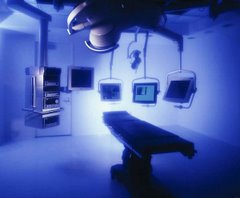
RFID (radio-frequency identification) is in use all around us . If you have ever had your pet micro-chipped with an ID tag, or used EZPass through a toll booth, you have used RFID technology.Unlike UPC bar-code technology, RFID technology does not require contact or line of sight for communication, and can be read through the human body, clothing and non-metallic materials.
As I explored this topic further after class one evening, I was very surprised at the many applications this technology has in the hospital setting. For instance, patient and equipment management tracking systems are based on RFID technology. I was aware of how operating room instrument tracking had RFID applications , as our hospital is currently investigating implementing this technology, however found many other interesting applications available for useage in healthcare. With RFID technology, instruments can be tracked by either complete kits , or down to the individual instrument used during a surgical procedure. Could this technology end incidence of instruments being left behind. In this article , RFID technology is not only applied to instruments, but sponges as well. Currently , we have radio-paqued sponges that show up on an x-ray if there is any question of a missing item after the surgical team checks the count. Patient safety is always at the foreront of operating room staff, and other healthcare workers.
RFID is being used to track patients on some units at our hospital, with specialy armbands . Currently utilized for elderly patients who tend to wander, in the future, we couldhave the ability to track every patient at all times , ensuring their safety , particularly in case of a fire.
Another usage I see as being very advantageous and may have potential cost savings, is tracking our equipment assets. Medical equipment comes with a very high price tag and to have the potential to track these high cost items at all times would make them not only more accessible, staff would spend less time searching for it! How many lap top computers grow legs and walk out of health care and other facilities?
It is exciting to see how technology will impact the way we work and enhance patient care and safety. It is also important to keep abreast of changes and embrace technology, and what it can do for us.


